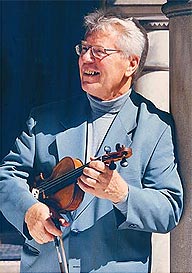
|
|||||||||
 |
String
Theory: They Are Winners Already
As
nice as it was to have been made a Knight of Dannenbrog, 1st Order,
in 1999 by the Queen of Denmark, Professor of Violin Milan Vitek
prefers to be remembered for more than a quarter century of teaching
young violinists, many of whom are laureates at some of the most
illustrious competitions in the world, including the Queen Elisabeth,
Carl Nielsen, Washington International, Corpus Christie Young Artists,
Finnish National, Jaroslav Kocian, Jean Sibelius, and Jeunesses
Musicales. Most recently his student Julia Sakharova '03 took first
prize in the 2002 Olga Koussevitzky Competition for Strings [see
"Accolades," p. 10]. Vitek seems to have the Midas touch when it comes to preparing young musicians for the rigors of competition, the merits and the drawbacks of which he discussed, among other aspects of a musical life, in the living room of his Oberlin home, into which he and his wife, Sofia, had moved just three months earlier. A Hindsberg baby grand piano is snug in a bay window, flanked at the right by shelves lined with books in English (the Grove Dictionary of Music and Musicians) and in Czech (novels by Karel Capek and Vaclav Havel). Tea and Danish cookies were offered as Vitek made himself comfortable in a chair from Norway. These international markers illuminate the geography of Vitek's life. He was born in Czechoslovakia, where he cofounded and served as concertmaster of the Prague Chamber Soloists and as leader of the Czech Nonet, the official chamber ensemble of the Czech Philharmonic Orchestra. He fled his homeland for Denmark in 1968 when Soviet troops arrived to snuff out the Czech reform movement known as the Prague Spring. With the exception of two years in Canada, various teaching assignments and performances throughout Scandinavia, Germany, and Switzerland, and a year as visiting professor at Oberlin, he spent the 33 years that followed in Denmark, most of them as professor of violin at the Royal Academy of Music in Copenhagen; he also founded the Danish Chamber Orchestra and cofounded the Trio Pro Arte. He joined Oberlin's faculty in 2001. There
are certain "skips in the track" - either in comprehension
or in syntax - when interviewer and subject do not share a
primary first language. An example of the former: one question inspired
Vitek to consider whether there is any difference between an idea
and an opinion. "An idea could be a question of the moment," he
concluded, "but opinion is a more constant condition based on experience."
An example of the latter: Vitek was given sample questions in advance
of our interview, to which he typed out the answers in Czech (although
he did not refer to his notes during the actual conversation). All
of his responses were in English. I have elected, with few exceptions,
to render his responses into a grammatically standard form. MV: I would not say there is a secret. You are, of course, working more intensely to prepare the students for competition, but I think what is important is the basic work must be done. What is the basic work? MV: To build up their technical skills and their understanding of the music they are going to play. Competitions are just the result of daily work, although I often have students play their programs through for an audience. That way they are used to playing for people. In this sense it is perhaps a kind of special preparation. What advice do you give students to help them deal with the stresses and pressures of competition, or when they are competing against good friends? MV: I say they should play like they play for a concert, for the audience. In that, there is no element of competition. Also, because they work so hard to be very good for the competition, they generally improve. So I always tell them that they are winners already because of the amount of work they've done, the increasing mastery of their playing, and their expanded repertoire. If they win a prize in the competition, great. But if not, they already have achieved so much that it doesn't matter in principle. In
my own experience, when I've competed with friends, it's not personal.
It's possible there are some who take it personally. But, for example,
here at Oberlin's Concerto Com-petition, the four violin students
wished each other good luck. I didn't feel any tension or change
in their attitude toward each other at all. I think they were great,
all of them. It's like that in other competitions. I don't think
there's a Lucky? MV: Because it's the condition of the moment. If you are in good spirits, that helps. This is what I mean by luck, to be in good emotional balance, good physical health. It happens so many times that some people go to a competition and win a prize, but they go to the next competition and don't make it to the second round. The difference in the level of playing between good players is so very small that luck is also always necessary. Going back to your own experience in competitions, do you remember those winning moments as being pivotal? Did you tell yourself, "This is going to change everything?" MV: After I won the prize in the Jacques Thibaud competition, of course I was excited, but I don't think I was flying so high in the sky that I had to land hard. [laughs] No, that was not a problem for me. Competitions were never a goal for me, but an inspirational and motivational element. Is there ever a downside to winning a competition? MV: This is difficult to imagine, but yes, perhaps. If somebody had really great expectations, if somebody thinks, "Now I've won; I'm going to have a solo career," then, if the career doesn't happen, the achievement could be anticlimactic. What are some of the obvious benefits of winning a competition? The money? MV: That doesn't last very long! [laughs] What about the publicity? Although there doesn't seem to be as much publicity when someone wins an award. Are there too many competitions? MV: There are many competitions; it's hard to say if there are too many. And there are many winners, but only a few players who can sustain a career, who have not only talent for the music but also talent for administrating a career - for marketing it. There is also too much fixation on the competition. For example, some students told me that if you are not winning important competitions, your chance to get a job in their country is quite diminished. There are musicians who don't enter competitions because they just don't like them; it doesn't mean that they are lesser players or lesser musicians. I think what makes me happy, as much as my students winning competitions, is the fact that almost all of them have jobs. That's really more important. Your own career has been, for the most part, a European one. Why did you decide to settle in the United States? MV: I think there is a danger when you spend too many years in the same place. The security could lead to a kind of complacency. When you come to another place there is something new to build or to start or to do. It keeps you more active and alive. After living and working in Oberlin for nearly two years, have you found that you are no longer in danger of complacency? Has the Conservatory infused your career with new challenges? MV: Definitely. Oberlin has a high standard for its students. The amount of knowledge they have to master here is much greater than what my experience has been in Scandinavia. And the environment - having the College and the Conservatory together - is very special. The interests of the students are broader; they extend beyond music. |
||||

